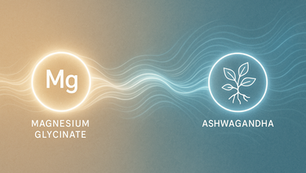top of page
Insights from Nature


Magnesium and Turmeric: A Natural Duo for Calm and Recovery
Inflammation, muscle tension, and chronic stress often go hand in hand — and they can silently drain your energy, focus, and overall health. While magnesium and turmeric are powerful on their own, combining them may offer broader benefits for recovery, mood, and long-term wellness. Magnesium supports muscle relaxation, nerve balance, and stress resilience, while turmeric (and its active compound, curcumin) helps control inflammation and oxidative stress.


Magnesium Glycinate and Vitamin B6: A Smart Pairing for Energy and Hormonal Balance?
Feeling fatigued, moody, or out of balance? You’re not alone. Stress, poor diet, & long workdays can deplete key nutrients that keep the nervous system steady & energy levels consistent. Two of the most important — & often overlooked — are magnesium & vitamin B6. Magnesium glycinate is a highly absorbable form that calms the body & supports hundreds of cellular functions. Vitamin B6 (pyridoxine) helps convert food into energy & regulates mood-related neurotransmitters. When t


Magnesium Glycinate and Ashwagandha: Synergy for Stress Relief?
Chronic stress has become part of modern life — affecting sleep, mood, digestion, and even hormones. While medication and therapy remain vital tools, many people look to natural support to restore balance. Two of the most researched and effective natural ingredients are magnesium glycinate and ashwagandha. Magnesium helps calm the nervous system, while ashwagandha is an adaptogen that helps the body cope with stress. Taken together, they may offer deeper relaxation and resili


Magnesium Glycinate and L-Theanine: A Calming Combination?
Life today can feel overwhelming. Between stress, constant notifications, and busy schedules, many people are turning to natural ways to restore balance. Two of the most popular calming supplements are magnesium glycinate and L-theanine. Magnesium glycinate is well known for its ability to relax the nervous system and support deeper sleep. L-theanine, an amino acid found in green tea, promotes calm focus without sedation. Taken together, could they offer even greater benefits


Magnesium Glycinate and Vitamin D3: Do They Work Better Together?
Magnesium and vitamin D3 are two nutrients often discussed together, and for good reason. While vitamin D3 supports calcium absorption and bone strength, magnesium is essential for activating vitamin D in the body. Without magnesium, vitamin D may not work effectively. Magnesium glycinate, known for its high absorption and gentle effect on the stomach, is a popular choice for supplementation. But does combining magnesium glycinate with vitamin D3 really make a difference? Let


Magnesium Glycinate Combinations: How It Works with Vitamin D3, Vitamin B6, L-Theanine, Ashwagandha, and Turmeric
Magnesium glycinate has earned a reputation as one of the most effective and gentle forms of magnesium. Known for its calming effect, high absorption, and digestive comfort, it’s often chosen by people looking to improve sleep, ease stress, or reduce muscle tension. But what happens when you combine magnesium glycinate with other nutrients or herbs? Could pairing it with vitamin D3, vitamin B6, L-theanine, ashwagandha, or turmeric enhance its benefits?


Magnesium Glycinate with Food or Empty Stomach? Best Practices
When adding a supplement to your routine, timing can make a difference. Magnesium glycinate is one of the most absorbable and gentle forms of magnesium, but people often wonder: Is it better to take it with food or on an empty stomach? Magnesium glycinate can be taken either way, but most people tolerate it better with food. Let’s explore the science behind absorption, common experiences, and how to decide the best timing for you.


How Long Does Magnesium Glycinate Take to Work?
When starting a new supplement, one of the first questions people ask is: How long does it take to notice a difference? Magnesium glycinate is no exception. Known for being highly absorbable & gentle on the stomach, it’s a popular choice for sleep, stress balance & muscle support. The reality is that results vary. Some people notice benefits in just a few days, while for others, it may take weeks. Let’s explore what science and experience reveal about magnesium glycinate’s ti


Best Time to Take Magnesium Glycinate: Morning vs Night
Magnesium glycinate is one of the most popular forms of magnesium because it’s highly absorbable & easy on digestion. People use it for better sleep, calmer moods, stress balance & even muscle recovery. But one question comes up: When is the best time to take magnesium glycinate—morning or night? The truth is that timing depends on personal health goals & how the body responds. Some people prefer it in the morning for calm focus, while others benefit more from a nighttime dos


Magnesium Glycinate: Key Interactions to Know Before Use
Magnesium glycinate is often chosen because it’s highly absorbable and easy on the stomach. Many people take it daily for better sleep, reduced stress, or muscle recovery. But like most supplements, it isn’t free from potential interactions. If you’re taking prescription medications, it’s important to know how magnesium glycinate may affect them—and how to use it safely without reducing their effectiveness.


Magnesium Glycinate Side Effects: What to Watch Out For
Magnesium glycinate is often praised as one of the gentlest and most effective forms of magnesium. Thanks to its high absorption and calming properties, it’s a popular choice for sleep support, stress relief, and muscle relaxation. But even the best supplements can have side effects. While most people tolerate magnesium glycinate well, some may experience digestive discomfort or interactions with medications. Knowing what to watch for ensures you can use it safely and confide


Magnesium Glycinate During Pregnancy: What Mothers Should Know
Pregnancy is a time when the body’s nutritional needs increase. Many mothers-to-be experience fatigue, restless sleep, leg cramps, or heightened stress—all of which may be linked to magnesium levels. Magnesium glycinate is often considered because it’s gentle on the stomach and highly absorbable. But the big question is: Is magnesium glycinate safe during pregnancy? This article breaks down what the research says, the potential benefits & the precautions every mother should k


Who Should Not Take Magnesium Glycinate?
Magnesium glycinate is a popular supplement for sleep, stress relief & muscle support. It’s well absorbed, gentle on the stomach, and safe for most people. But like any supplement, it’s not right for everyone. Certain health conditions, medications, or life stages may require caution—or even complete avoidance. If you’ve ever wondered, “Is magnesium glycinate safe for me?”, this guide will help you understand who should think twice before taking it.


Is Magnesium Glycinate Safe to Take Every Night? How to use
Magnesium glycinate has become one of the most trusted forms of magnesium. It’s well absorbed, easy on digestion, and often chosen for sleep support, stress relief, and muscle recovery. But when it comes to taking it daily, the big question is: how much is the right amount? The ideal dosage depends on your health goals, diet, and individual needs. In this guide, we’ll break down recommended amounts, safe ranges, and tips to make sure you’re getting the most benefit without ov


Magnesium Glycinate Dosage: How Much Should You Take Daily?
Magnesium glycinate has become one of the most trusted forms of magnesium. It’s well absorbed, easy on digestion, and often chosen for sleep support, stress relief, and muscle recovery. But when it comes to taking it daily, the big question is: how much is the right amount? The ideal dosage depends on your health goals, diet, and individual needs. In this guide, we’ll break down recommended amounts, safe ranges, and tips to make sure you’re getting the most benefit without ov


Magnesium Glycinate Dosage and Safety: What You Need to Know
Magnesium glycinate is one of the most popular forms of magnesium because it’s gentle on the stomach, well absorbed, and provides calming effects that support sleep, stress management, and overall wellness. Even though it’s considered safe for most people, questions often come up: How much should I take? Is it safe to use every day? What are the side effects? This guide breaks down everything you need to know about dosage, timing, safety, and when to be cautious.


Is Magnesium Glycinate Safe for Kids? What Parents Should Know
Parents often look for safe & natural ways to support their children’s health, especially when it comes to sleep, focus, or muscle comfort. Magnesium is an essential mineral for growth & development, & magnesium glycinate is known for being gentle & easy to absorb. But when it comes to kids, the question is: Is magnesium glycinate safe? This article explores what parents should know before giving it to children, including recommended intake, safety guidelines & when to seek p


Magnesium Glycinate vs Magnesium Oxide: Which Is Right for You?
Magnesium is an essential mineral involved in energy production, nerve signaling, and muscle function. With nearly half of U.S. adults not meeting the recommended intake, supplements have become increasingly popular. But not all magnesium supplements are created equal. Two of the most common forms—magnesium glycinate and magnesium oxide—offer very different benefits, absorption rates, and tolerability. Choosing the right one depends on your health goals.


Magnesium Glycinate Chelate: What It Means for Absorption
If you’ve shopped for supplements in the U.S., you’ve probably noticed labels that say “magnesium glycinate chelate”. For many consumers, the word chelate is confusing. Does it mean the supplement is stronger? More effective? Or just marketing? The truth is that chelation is one of the key reasons why magnesium glycinate is better absorbed than many other forms. Understanding this process helps explain why this form is often recommended for sleep, stress, and long-term wellne


Magnesium Glycinate vs Magnesium Citrate: Which Is Better?
Magnesium is one of the most essential minerals in human health, supporting over 300 enzymatic reactions. Yet, many Americans do not consume enough through diet alone. This gap is often filled by supplements, but the question remains: which form is best? Two of the most popular types are magnesium glycinate and magnesium citrate. Each has unique benefits, side effects, and ideal uses. Understanding their differences will help you make the best choice for your health goals.


Magnesium Glycinate vs Citrate, Oxide, and More: Choosing Best Form
Magnesium is an essential mineral that supports hundreds of biochemical processes, from energy production to nerve function and muscle recovery. Yet, many Americans do not get enough magnesium from their diet alone. According to the National Institutes of Health (NIH), nearly half of U.S. adults fall short of the recommended intake. This has made magnesium supplements increasingly popular—but with so many forms available, it can be confusing to choose the right one.


Magnesium Glycinate for Women: Hormone, Sleep, and Stress Support
Magnesium glycinate benefits women by easing PMS symptoms, improving sleep quality, reducing anxiety, supporting healthy pregnancy, and protecting bone and muscle health. Its high absorption and gentle profile make it an ideal choice for daily use.


Magnesium Glycinate for Constipation: Is It Effective?
Constipation is one of the most common digestive complaints in the United States, affecting around 16% of adults and up to 33% of older Americans. Many turn to over-the-counter remedies, including magnesium-based supplements, for relief. Among the different forms, magnesium glycinate often raises questions. While it is highly absorbable and gentle on the stomach, is it the best option for relieving constipation, or are other forms more effective?


Magnesium Glycinate for Headaches and Migraines: What Science Says
Migraines and chronic headaches affect more than 39 million Americans, according to the American Migraine Foundation. For many, conventional medications are not enough—or cause unwanted side effects. As a result, natural approaches like magnesium glycinate are gaining attention. Magnesium has long been studied for its role in migraine prevention. Among the different forms, magnesium glycinate stands out for its gentle absorption & calming effect. But what does the science rea
bottom of page